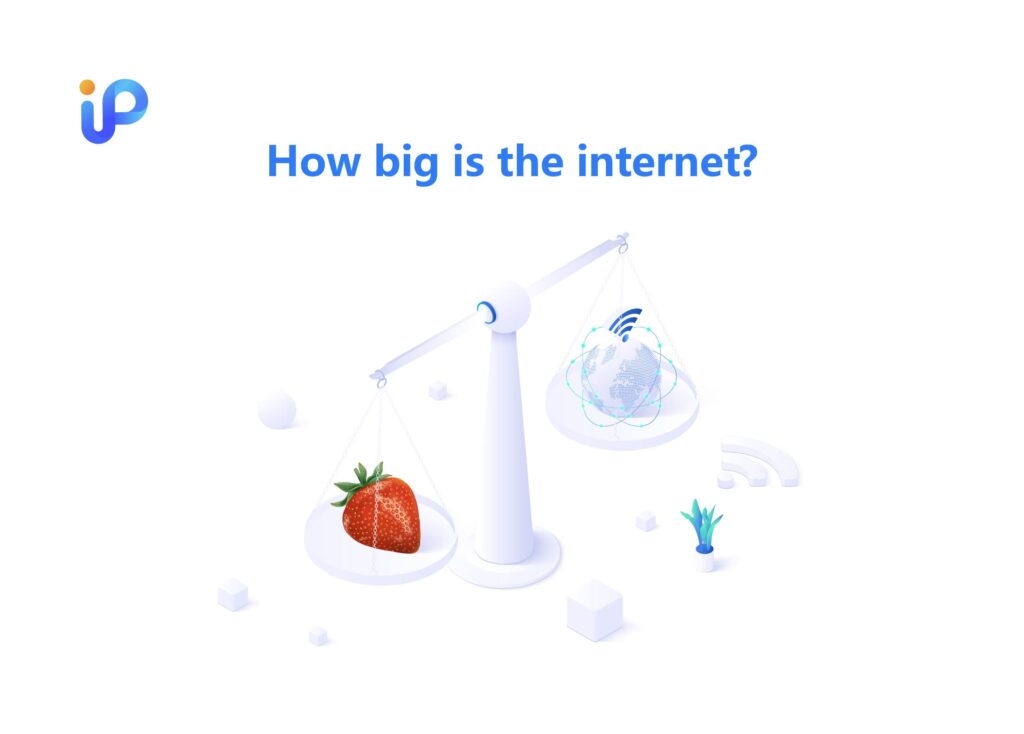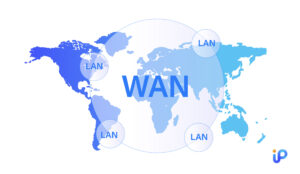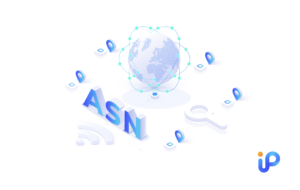6 Min Read |14 Aug 2024 | Key Words: Internet, IPv4, IPv6, Cloud security, Data packets,
The internet, an invisible network that we rely on every day, is an astonishingly vast and intricate web of connections that span the globe. But how big is the internet really? Let’s delve into the enormity of this digital universe and explore what makes it such an integral part of our lives.
Interestingly, scientists have tried to measure the internet’s physical weight. Estimates vary, with some suggesting it weighs around 60 grams, comparable to a strawberry
The Internet in Numbers
Here are some figures to put the internet’s size into perspective:
- 2.25 billion indexed web pages
- 4.95 billion internet users as of January 2022
- By 2025, over 376 billion emails will be sent daily
- The global data sphere is expected to grow to 175 zettabytes by 2025
- 27.1 billion IoT devices by 2025
- 4,294,967,296 IPv4 addresses
- 340 undecillion IPv6 addresses
A short history of the internet
The internet is a network of computer systems communicating through various protocols, with the Internet Protocol (IP) being crucial for routing data. Here’s a brief history:

- 1962 – J.C.R. Licklider develops the concept of the Galactic Network
- 1967 – Lawrence G. Roberts introduces the concept of ARPANET
- 1969 – UCLA and SRI connect to create the world’s first computer network
- 1974 – Vint Cerf and Bob Kahn coin the term internet (short for internetworking)
- 1981 – Internet Protocol version 4 is defined and introduced
- 1982 – The TCP/IP suite is adopted as the protocol standard
- 1988 – IANA (Internet Assigned Numbers Authority) is founded
- 1989 – The first commercial ISPs (internet service providers) emerge in the US and Australia
- 1990 – Tim Berners-Lee develops the HTTP protocol and the HTML language
- 1992 – The first Regional Internet Registry (RIPE NCC) is founded in the Netherlands
- 1995 – Internet Protocol version 6 is defined and introduced
- 1997 – IEEE (Institute of Electrical and Electronics Engineers) introduces Wi-Fi
- 1998 – ICANN (Internet Corporation for Assigned Names and Numbers) is founded
- 2004 – The fifth and final RIR (AFRINIC) is established in Mauritius
- 2011 – IANA officially allocates the last /8 from its IPv4 pool, marking the global IPv4 exhaustion
- 2012 – The Internet Society celebrates the World IPv6 Launch day to promote IPv6 adoption
How does the internet work?
The answer might seem obvious, but most people only understand the internet as the light on the modem. If it’s green, we have internet!
In essence, the internet is a network of computer systems communicating with each other. But how does it work? Let’s look at how home users load websites.
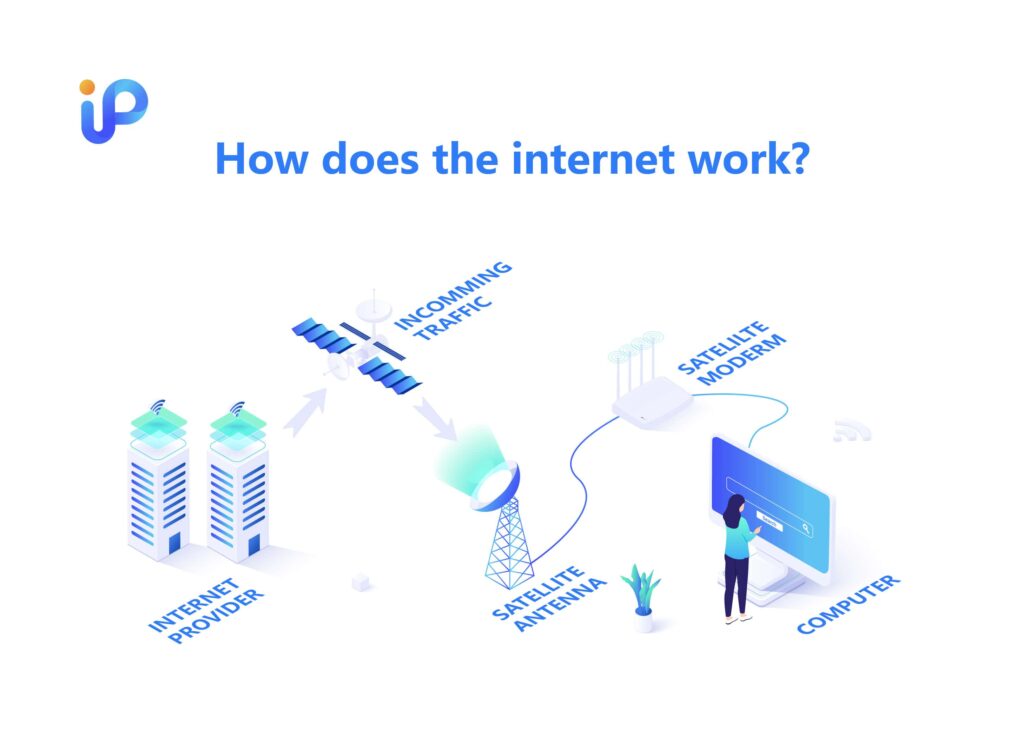
First, you need a modem to connect to an internet service provider (ISP). Once connected, you open a web browser and enter a website’s domain name. Your ISP processes this query using the Domain Name System (DNS) to find the corresponding IP address. The browser then sends an HTTP request to a server, which responds with data packets. These packets are reassembled, and the web page loads in milliseconds.
DNS translates domain names into numeric IP addresses, which are crucial to the internet’s functionality. But just how important are they?
IP addresses as a unit of scale
The internet is a network of computer systems communicating with each other. Various protocols facilitate this communication, with the Internet Protocol (IP) being one of the most important. Why? It routes and addresses data packets.
IP addresses are crucial because they ensure data packets reach their correct destinations. These unique numbers identify devices on the internet, making it possible to send and receive data. Without IP addresses, data would have no way of knowing where to go.
Think of IP addresses like postal addresses. If a letter has a destination address, it can be delivered, and if it has a return address, it’s clear where it came from. Similarly, data packets can only travel efficiently if both the sender and recipient addresses are known.
The new era of IPv6 vs the huge demand of IPv4
When it comes to IPv4 vs. IPv6, quite a few differences exist, and it is no secret that the newer version is superior. This version emerged as soon as it became obvious that the fourth version of the IP could not support the internet forever. Still, IPv4 reigns supreme.
Unfortunately, IPv4 addresses – the building blocks of the internet – were officially exhausted when IANA allocated the last IP blocks from its pool back in 2011. That, however, did not imply the end of the IPv4 address. Although IPv6 was intended as a replacement, IPv4 continues to be perhaps the most integral part of the internet today.
IPv6 was invented to address the limitations of IPv4, primarily due to the exhaustion of available addresses. Key reasons include:
- Scalability: Supports a vastly larger number of devices.
- Simplified Network Configuration: Enables devices to automatically generate their own IP addresses.
- Improved Security: Includes mandatory IPsec for enhanced data integrity and encryption.
- Enhanced Performance: More efficient packet routing and processing.
- Better Support for Mobile Devices: Facilitates seamless network transitions.
- Elimination of NAT: Removes the need for Network Address Translation, simplifying direct device communication.
The size of the IPv4 space
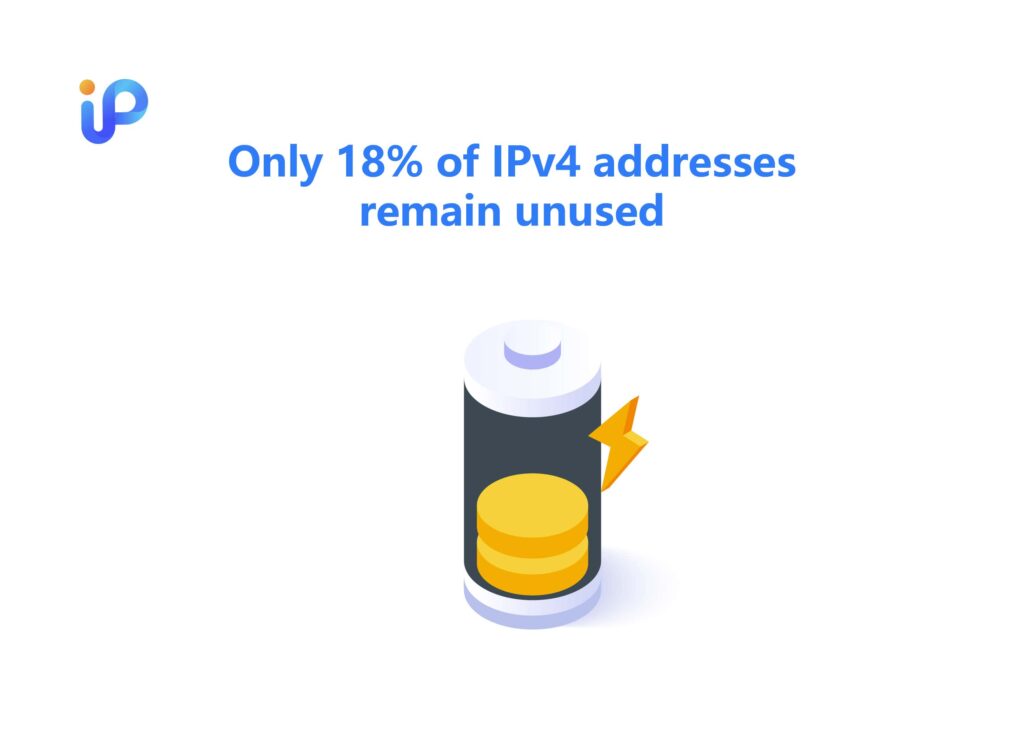
IPv4 has about 4.3 billion addresses, but many are unused. Estimates suggest around 800 million IPv4 addresses are unutilized, with significant portions remaining unadvertised. Should we measure the internet by total IPs or only those in use?
Due to its limited availability, IPv4 addresses have become a commodity. The market for buying and selling these addresses has grown, driven by high demand and limited supply.
Sustainable management expands the internet
By utilizing the resources available to us logically and responsibly, we can build a more sustainable internet. The kind of internet that provides companies big and small with the same opportunities to scale operations and grow.
Yes, the internet supported by IPv4 addresses is somewhat constrained – simply because we have exhausted all free IP addresses – but there are still gaps that lack responsible management. If we bring all unused resources back into the market, it is possible to alleviate the global shortage and assist the transition to an IPv6-supported internet.
As the internet grows in size, everyone from internet architects to business owners must utilize the available resources responsibly and sustainably. IPv4 leasing is one of the tools that can help balance the current state within the market and, hopefully, expand the internet just a little bit more.
To stay updated on the latest developments and to explore how IPv4 leasing can benefit your business, visit IPv4 Superhub for more information and expert consultation

